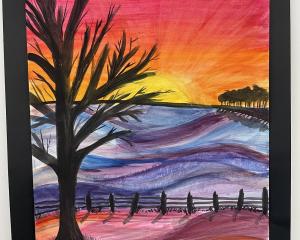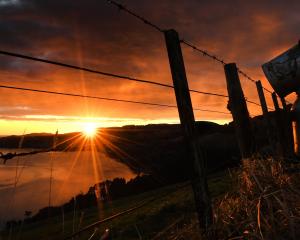They jumped off a boat into the rough swells of the Aegean Sea, struggling to shore, weighted down by a 30kg pack.
Arriving on a 30m-wide beach, bordered by steep, inhospitable cliffs, they were showered by bullets.
This was Gallipoli, and it was only the beginning.
After picturing such a scenario, it is hard to imagine why anyone would put themselves in such a position, especially if they lived in a country far away from the conflict, where grassy knolls stretch for miles, where every town is a tight-knit community, and where the purpose of life is to enjoy the beauty that surrounds you with those whom you love.
However, this is what more than 100,000 New Zealanders did when they enlisted to serve in World War 1, and they did this out of a sense of loyalty to Britain, which at the time was still seen as the mother country by the majority of New Zealanders.
If more than 100,000 New Zealanders enlisted in World War 1, you may ask why the story of the 13,000 soldiers who served at Gallipoli has such a special place in the hearts of all New Zealanders.
The Battle of Gallipoli was a military disaster.
If something ever deserved to be described as a failure, it is this battle, which from start to finish was plagued by mistakes, miscalculations and misunderstandings.
The landing was 1.6km north from where it was supposed to be, which caused our soldiers to land on a narrow beach surrounded by sheer cliff faces, rather than on a widespread beach surrounded by rolling hills.
Fighting on such tough terrain took its toll on the men, especially as the Turks had a bird's-eye view from the top of the cliffs.
The summer heat was another element which had not been taken into account, and the dysentery and gastroenteritis were killing as many men as were dying in battles.
Perhaps most importantly, the inadequate amount of time that had been allowed to plan Gallipoli (three weeks) had caused insufficient men and guns to be sent to the battle, almost guaranteeing defeat from the start.
How is it possible then, that every year on April 25 we gather together to remember this catastrophe?
The answer lies in the very nature and spirit of all New Zealanders, and a prime example of this nature and spirit is Lieutenant-colonel William George Malone, commander of the Wellington Battalion, which fought at Gallipoli.
Lt-col Malone was a lawyer from Stratford, Taranaki, who attempted to rectify the dire situation at Gallipoli from the beginning, and who was not afraid to stand up for his men.
Two days after landing at Anzac Cove, the Wellington Battalion and the Australian 2nd Battalion were asked to secure Walker's Ridge.
Lt-col Malone achieved this directive by nightfall.
However, feeling that the commander of the 2nd Battalion had wasted the lives of his men, he requested that the Wellington Battalion take up sole position on the ridge, and this request was granted.
Lt-col Malone's loyalty and love for his men was made apparent on a number of further occasions.
He frequently argued with his commanding officers for building material and supplies for his men, and on August 7 when he was directed to capture Chunuk Bair in broad daylight, he refused, stating: ''I'm not going to send them over to commit suicide.''
Before dawn on August 8, Lt-col Malone and his men captured Chunuk Bair, virtually unopposed.
However, Chunuk Bair proved impossible to defend, and at 5pm that day, Lt-col Malone was killed, fighting side by side with his men.
How much Lt-col Malone was loved and respected by his men can be seen by the fact that when they returned home, the Battalion paid for the construction of the Malone Memorial Gate - a marble gate at the entrance to King Edward Park, in Stratford, and one of New Zealand's largest war memorials to commemorate an individual soldier.
Every year on August 8, a ceremony is held there to honour Lt-col Malone's memory, a testament to a truly great Kiwi.
As New Zealanders, we can see a number of Lt-col Malone's attributes reflected in our national identity: common sense, determination, loyalty, camaraderie and ingenuity.
This is because it was at Gallipoli that we took our first steps as a nation.
Rather than seeing ourselves as fighting for Britain, we began to see ourselves as fighting for New Zealand.
As New Zealand soldiers looked around, they saw commanders of other nations who remained behind in safe headquarters rather than fighting with their men, who were prepared to risk the lives of their men without searching for a better way, and who, in effect, separated themselves from their men, because they saw themselves as something better.
In contrast, they saw their own commanders, like Lt-col Malone, who were prepared to stand side by side with them, and fight to the death, to protect a country where community and unity were what mattered most.
This is why Gallipoli has a special place in the hearts of every New Zealander.
It fostered a sense of unity among us, and allowed us to see that, although we are a small country, we are a country from which other great nations can learn some valuable lessons.
Gallipoli gave us our national identity.
Every time a New Zealand sports team steps on to the pitch, every occasion where we stand together to sing our national anthem, and every Anzac Day, this New Zealand identity can be seen.
We are a nation which stands together in the face of tragedy, whether it be the Christchurch earthquakes, where schools around the country dressed in red and black to raise money for the rebuilding, and where people from all over New Zealand travelled to Christchurch to help deal with the aftermath, or the Pike River mine disaster.
We are a country whose ingenuity and determination has led to inventions from the electric fence to bungy jumping to jet-boats.
We are a country whose loyalty and love for one another leads to extraordinary feats of strength, such as demonstrated by Lance-corporal Willie Apiata, in the Afghanistan war, who carried an injured comrade over 70m of exposed ground to safety.
We are a country, and we are Gallipoli.
• By Jeremy Hadfield, Year 13, Bayfield High School













